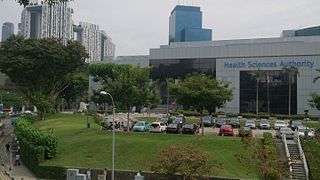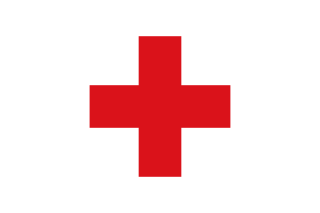Related Research Articles

Blood transfusion is the process of transferring blood products into a person's circulation intravenously. Transfusions are used for various medical conditions to replace lost components of the blood. Early transfusions used whole blood, but modern medical practice commonly uses only components of the blood, such as red blood cells, plasma, platelets, and other clotting factors. White blood cells are transfused only in very rare circumstances, since granulocyte transfusion has limited applications. Whole blood has come back into use in the setting of trauma.
Transfusion medicine is the branch of medicine that encompasses all aspects of the transfusion of blood and blood components including aspects related to hemovigilance. It includes issues of blood donation, immunohematology and other laboratory testing for transfusion-transmitted diseases, management and monitoring of clinical transfusion practices, patient blood management, therapeutic apheresis, stem cell collections, cellular therapy, and coagulation. Laboratory management and understanding of state and federal regulations related to blood products are also a large part of the field.

A blood bank is a center where blood gathered as a result of blood donation is stored and preserved for later use in blood transfusion. The term "blood bank" typically refers to a department of a hospital usually within a clinical pathology laboratory where the storage of blood product occurs and where pre-transfusion and blood compatibility testing is performed. However, it sometimes refers to a collection center, and some hospitals also perform collection. Blood banking includes tasks related to blood collection, processing, testing, separation, and storage.

The Hong Kong Red Cross is the national Red Cross society of Hong Kong as part of the International Red Cross and Red Crescent Movement. Its head office is in West Kowloon.
Jehovah's Witnesses believe that the Bible prohibits Christians from accepting blood transfusions. Their literature states that, "'abstaining from ... blood' means not accepting blood transfusions and not donating or storing their own blood for transfusion." The belief is based on an interpretation of scripture that differs from other Christian denominations. It is one of the doctrines for which Jehovah's Witnesses are best known.
The Irish Blood Transfusion Service (IBTS), or Seirbhís Fuilaistriúcháin na hÉireann in Irish, was established in Ireland as the Blood Transfusion Service Board (BTSB) by the Blood Transfusion Service Board (Establishment) Order, 1965. It took its current name in April 2000 by Statutory Instrument issued by the Minister for Health and Children to whom it is responsible. The Service provides blood and blood products for humans.
NHS Blood and Transplant is an executive special health authority of the United Kingdom's Department of Health and Social Care. It was established on 1 October 2005 to take over the responsibilities of two separate NHS agencies: UK Transplant, founded by Dr. Geoffrey Tovey in 1972, and the National Blood Service. Its remit is to provide a reliable, efficient supply of blood, organs and associated services to the NHS. Since NHSBT was established, the organisation has maintained or improved the quality of the services delivered to patients, stabilised the rising cost of blood, and centralised a number of corporate services.

The Department of Health, Ulster-Scots: Männystrie o Poustie) is a devolved Northern Irish government department in the Northern Ireland Executive. The minister with overall responsibility for the department is the Minister of Health.

The Health Sciences Authority (HSA) is a statutory board under the Ministry of Health of the Government of Singapore. It is a multi-disciplinary agency responsible for applying medical, pharmaceutical, and scientific expertise to protect and advance public health and safety.

The Scottish National Blood Transfusion Service (SNBTS) is the national blood, blood product and tissue provider. It makes up a Strategic Business Unit of NHS National Services Scotland (NSS).

Nepal Red Cross Society is an independent, volunteer-based and humanitarian organization that delivers humanitarian service and support to the vulnerable people in an impartial and neutral manner. It came into being on 4 September 1963. Nepal Red Cross Society was officially registered in Nepal after Nepal Government acceded to the Geneva Conventions. Having been recognized by the International Committee of the Red Cross (ICRC) and affiliated to International Federation of Red Cross and Red Crescent Societies (IFRC) on 1 October 1964.
The New Zealand Blood Service is the provider of blood services for New Zealand. The service is a Crown entity responsible to New Zealand's Parliament and is governed by a Board appointed by the Minister of Health.

Birmingham Accident Hospital, formerly known as Birmingham Accident Hospital and Rehabilitation Centre, was established in April 1941 as Birmingham's response to two reports, the British Medical Association's Committee on Fractures (1935) and the Interdepartmental Committee (1939) on the Rehabilitation of Persons injured by Accidents. Both organisations recommended specialist treatment and rehabilitation facilities. The hospital, generally recognized as the world's first trauma centre, used the existing buildings of Queen's Hospital, a former Teaching Hospital in Bath Row, Birmingham, England, in the United Kingdom. It changed its name to Birmingham Accident Hospital in 1974 and closed in 1993. A listed building, it is now part of Queens Hospital Close, a student accommodation complex. A blue plaque commemorates its former role.
Blood transfusion was first performed in Sri Lanka in late 1950. It became more widely known to the public in 1959 after the assassination of Prime Minister S.W.R.D. Bandaranaike, when an appeal was made to the public to donate blood. The country's blood bank system has since expanded from a single initial site to multiple blood donation centres and laboratories nationwide, operating under the auspices of the National Blood Transfusion Service (NBTS). As of 2014, the NBTS collects over 350,000 voluntary blood donations every year.
The Welsh Blood Service is a division of Velindre University NHS Trust responsible for the collection of blood in Wales, and of the distribution of blood products to hospitals within the country, as well as other related functions.
Mujibur Rahman was a Bangladeshi medical scientist. He established the first blood transfusion center at the Institute of Post Graduate Medicine and Research. He was awarded Ekushey Padak in 2014 by the Government of Bangladesh for his contribution to social service.
Blood donations in India are conducted by organisations and hospitals through blood donation camps. Donors can also visit blood banks in hospitals to donate blood. Efforts by the government and advocacy groups over the years have helped bridge the gap between demand and supply. The regulatory framework for blood donation and blood bank management rests with the Central Drugs Standard Control Organisation, while technical bodies like the National Blood Transfusion Council and National AIDS Control Organisation formulate guidelines and recommendations for transfusion medicine and blood bank management. Challenges persist with regards to regulation of blood banks and transfusion practices as the sector is largely fragmented with uneven distribution of blood banks and supply of blood in parts of the country. Donors are usually provided with refreshments after the procedure, which include glucose drinks, biscuits and fruits. Some organisations offer transportation facilities, as well as certificates or badges as gratitude.
NHSBT Blood Donation is responsible for the collection and distribution of blood products within England. Other parts of the United Kingdom are served by the Northern Ireland Blood Transfusion Service, the Scottish National Blood Transfusion Service, and the Welsh Blood Service. Blood Donation is part of NHS Blood and Transplant, which was established as a special health authority in October 2005 and also has responsibility for NHSBT Organ Donation and Transplantation.
Patricia Barker is an Irish academic, accountant and public body leader. One of the earliest staff at NIHE Dublin, she was later Professor of Accounting there, and then Registrar and Vice-President for Teaching and Learning, after it had become Dublin City University. She served nine years as a delegate to the International Accounting Standards Board. She has also worked as an international election monitor for the OSCE, a human rights observer in Israel and Palestine, and as chairperson of the Irish Blood Transfusion Service and a director of other public bodies. A holder of an MPhil in gender studies and a PhD on financial disclosure, she has written and co-written books and articles on accounting, ethics and gender equality.
References
- ↑ "History of the service". Northern Ireland Blood Transfusion Service. 2014. Retrieved 30 December 2014.